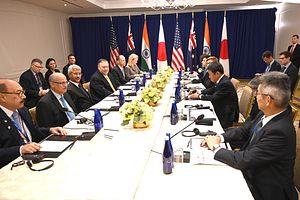Consultations between the “quadrilateral” are picking up in 2019. For the first time since their ministerial-level meeting in New York on the sidelines of the United Nations General Assembly, senior officials from the United States, India, Australia, and Japan met in Bangkok on Monday.
According to the U.S. Department of State’s readout on the meeting, the four met “for consultations on collective efforts to advance a free, open, and inclusive Indo-Pacific.” The meeting marked the continuation of the September 26 New York ministerial-level meeting’s agenda.
The U.S. statement noted that the Bangkok meeting focused on “advancing practical collaboration on counter-terrorism, cyber, development finance, maritime security, humanitarian assistance, and disaster response.”
In a separate statement, the Indian Ministry of External Affairs said the four parties “reaffirmed their commitment towards a free, open, prosperous and inclusive Indo-Pacific Region based on shared values and principles and respect for international law.”
Both the U.S. and Indian statements emphasized the “centrality” of the Association of Southeast Asian Nations (ASEAN) in their readouts. ASEAN leaders have expressed concern that the “quad” may seek to supplant ASEAN’s role in the region.
The latest round of quad consultations also explored “ways to enhance coordination on quality infrastructure based upon international standards such as the G20 Principles for Quality Infrastructure Investment, and discussed strengthening partnerships with existing regional frameworks,” according to the U.S. Department of State.
The four countries also resolved to continue their consultations at the ministerial level. A follow-up on the November 2019 meeting will be held in spring 2020.
In November 2017, after a 10-year hiatus, the “quad” reconvened at the working-level on the sidelines of that year’s ASEAN summitry in Manila.
The idea of a quadrilateral consultation among these four democracies with stakes in Asia’s regional order dates back to Japanese Prime Minister Shinzo Abe’s first nonconsecutive prime ministerial term from 2006 to 2007.
With growing concerns in all four quad capitals about Chinese foreign policy and regional influence, the group has found renewed relevance. Speaking in October, U.S. Secretary of State Mike Pompeo described one of the purposes of the quadrilateral as restraining China.
“We’ve reconvened ‘the Quad’ – the security talks between Japan, Australia, India and the United States that had been dormant for nine years,” Pompeo said in a Washington, D.C., policy address. “This will prove very important in the efforts ahead, ensuring that China retains only its proper place in the world.”
Responding to the first meeting of the reconvened “quad” in November 2017, a Chinese foreign ministry spokesperson said that “these visions and proposals should be open and inclusive.”
































